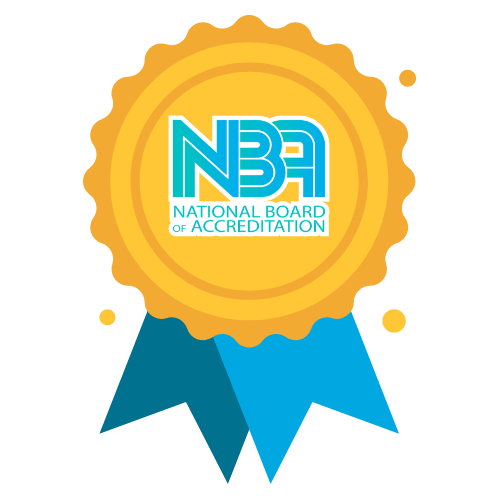Program Educational Objectives (PEOs)
- PEO 1: Graduates will have fundamental and advanced knowledge of core courses and inter disciplinary engineering for developing effective computing solution by incorporating creative and logical reasoning.
- PEO 2: Graduates will have capabilities to develop software, understand the technical specification, design and provide innovative solutions for society by diligence, team work and lifelong learning.
- PEO 3: Graduate will have good communication skill, leadership skill, ethical values ,time management in the profession.
- PEO 4: Graduate will have the ability to get employed in industries or pursue higher studies or turn as researchers or entrepreneurs.
Program Specific Outcomes (PSOs)
- PSO 1: Ability to comprehend, analyze, design and implement software and hardware systems using knowledge of modern tools and techniques to serve the society as professional Computer Science Engineers.
- PSO 2: Ability to apply mathematical methodologies to solve computational methodologies to solve computational task, model real world problem using appropriate data structure and suitable algorithms and to use knowledge of various domains to identify research gaps and hence to provide solutions to new ideas and innovations.
- PSO 3: Ability to learn and work in a team to develop interdisciplinary real life application systems.
Programme Outcomes (POs)
- PO 1: Engineering knowledge - Apply the knowledge of mathematics, science, engineering fundamentals, and an engineering specialization to the solution of complex engineering problems.
- PO 2 : Problem analysis - Identify, formulate, review research literature, and analyze complex engineering problems reaching substantiated conclusions using first principles of mathematics, natural sciences, and engineering sciences.
- PO 3 : Design/development of solutions -Design solutions for complex engineering problems and design system components or processes that meet the specified needs with appropriate consideration for the public health and safety, and the cultural, societal, and environmental considerations.
- PO 4 : Conduct investigations of complex problems - Use research-based knowledge and research methods including design of experiments, analysis and interpretation of data, and synthesis of the information to provide valid conclusions.
- PO 5: Modern tool usage - Create, select, and apply appropriate techniques, resources, and modern engineering and IT tools including prediction and modeling to complex engineering activities with an understanding of the limitations.
- PO 6 : The engineer and society - Apply reasoning informed by the contextual knowledge to assess societal, health, safety, legal and cultural issues and the consequent responsibilities relevant to the professional engineering practice.
- PO 7 : Environment and sustainability - Understand the impact of the professional engineering solutions in societal and environmental contexts, and demonstrate the knowledge of, and need for sustainable development.
- PO 8: Ethics - Apply ethical principles and commit to professional ethics and responsibilities and norms of the engineering practice.
- PO 9: Individual and team work - Function effectively as an individual, and as a member or leader in diverse teams, and in multidisciplinary settings.
- PO 10 : Communication - Communicate effectively on complex engineering activities with the engineering community and with society at large, such as, being able to comprehend and write effective reports and design documentation, make effective presentations, and give and receive clear instructions.
- PO 11 : Project management and finance - Demonstrate knowledge and understanding of the engineering and management principles and apply these to one’s own work, as a member and leader in a team, to manage projects and in multidisciplinary environments.
- PO 12 : Life-long learning - Recognize the need for, and have the preparation and ability to engage in independent and life-long learning in the broadest context of technological change.


